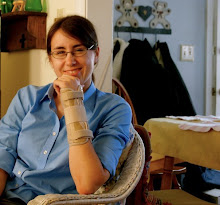21. Murder on Embassy Row (Margaret Truman)
- Another excellent Margaret Truman mystery, this time focused around DC's international delegations on Embassy Row, and most especially the elite caviar-centered worlds that some of them inhabited. Though I missed the central characters from the other Margaret Truman mysteries I've read, I enjoyed following this story and found it a very gripping and quick read.
- As much as I did enjoy this book and agreed with its premise-- the connection of land to spiritual feelings, with an eye for historical accuracy but not an obsession with it-- it was pretty one-sided. One might expect that, though with a subtitle like “A Journey By Land Through the Five Books of Moses.” Feiler is Jewish, though not strongly religious as the book begins, and the book focuses on the events of the Torah. As such, you find him focusing on the powerful spiritual connection that the Jewish people have to the land. In some ways it's a good companion to The Lemon Tree, which while a reasonably balanced account sometimes skewed toward the Palestinians. There were moments when I became upset with Feiler for being so distraught over the feelings that the Muslims he met also experienced toward the land. All in all, though, it was a good read and a good spiritual narrative.
- I have been trying to get through this behemoth of presidential history for some five to seven years now-- ever since my last Theodore Roosevelt obsession-- and now I finally did it. This is volume 2 of Edmund Morris's trilogy, and it focuses exclusively on Roosevelt's presidential years. It does so in minute detail, looking at policy, politics, and personal life in the White House. Though it obviously can't cover everything, Theodore Rex is nothing if not a thorough sweet of Rooseveltian presidential history.
- This book was written as a prequel to The Maltese Falcon by Dashiell Hammett, one of the greatest noir novels of all time, many years after the fact. Needless to say, Joe Gores is not Dashiell Hammett. That being said, Spade & Archer was a fun read depicting the cases of the years leading up to Falcon. It also did not feature Miles Archer nearly as much as I expected. Basically a fun but not “good” read.
- A classic detective story. Nick and Nora Charles are two of Dashiell Hammett's most famous characters, and this novel makes it clear why this is so. I actually saw the movie (the first one) before I read the book, and I was pleased to discover how close they are. Apparently some adaptations were better back in the day. Anyway, great writing, snappy dialogue, fun and fascinating characters-- all of these traits make The Thin Man a great read.
- I picked up this book when I was in Cherokee, NC, for an alt break trip, and I have to say, reading it took me back there again. Thirteen Moons is a historical fiction novel, centered around the “white chief” Will, who as a boy is sent off as an indentured servant to run a store in the mountains of western North Carolina, and is adopted there by Cherokee. It tells the story of his life from that point, to his ascent as a lawyer and lobbyist for the Cherokee, through the Removal to Oklahoma and how he gets his band of Cherokee to be able to stay, through the Civil War. It's a fantastic story with beautifully crafted prose. Highly recommend.
- This is McLaren's most recent book. I bought my copy after attending a talk he gave about it, and I'm glad I did. We've all heard people say, “I'm spiritual, but I'm not religious.” This book does a beautiful job of taking that idea and translating spiritual feelings into a series of semi-religious practices that do a wonderful job of exploring the depths of spiritual sensations. Never judgmental or overly condescending, McLaren's writing is personal and yet applicable to all who might wish to deepen their relationship with God, or who wish for a church that put the need for love above the need for any number of types of traditions. An excellent read, especially as I struggle through finding a new church for myself in a new location.
- A genuinely ridiculous book. I alternated between laughing at the idiosyncrasies of the main character, Ignatius J. Reilly, and being thoroughly disgusted and repulsed by him as a character. At any rate, it was extremely well written, and Reilly is an undeniably unique character in American literature. Deserving of its Pulitzer Prize, and worth reading...once, anyway.
- Yet another in my string of reading books about the life of Theodore Roosevelt, although this one is not exclusively about him. Rather, Thomas examines all the people involved in the time leading up to and including the Spanish-American War. On the pro-war side, this cast of characters included Roosevelt, his good friend Henry Cabot Lodge, and newspaperman William Randolph Hurst. On the other side, with a more intellectual and “civilized” bent, was Speaker of the House Thomas Reed and philosopher/professor William James. An excellent book that takes an honest look at the motivations behind the chronic human love of war. Plenty of shades of the conflicts of the 21st century in here, too.
- The Internet: now so ubiquitous a part of modern life that it staggers the imagination to think of going without it for even a day or two. We are a constantly connected people-- a trait which, Nicholas Carr argues, is rewiring our brains for an age of Google. The ability of humans to remember is diminishing in the face of a world where everything can be looked up. Carr does an excellent job with this book, making a case for how the Internet is changing us without passing a harsh judgment either for or against this reality. Superb book.
